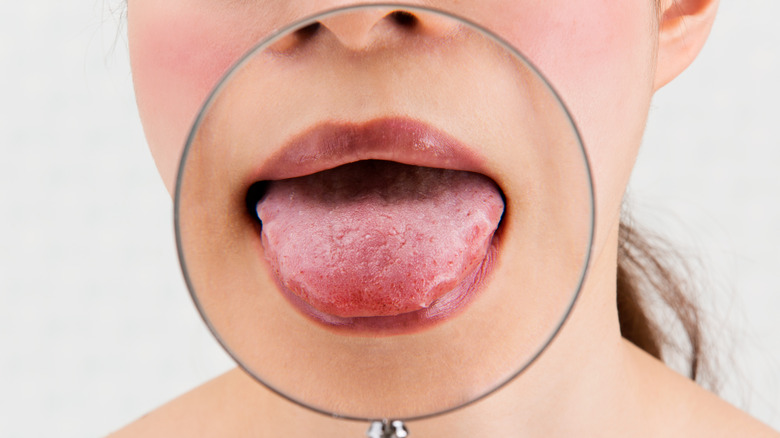Everything You Need To Know About Hypersalivation
If you find yourself drooling or notice that your child is salivating more than usual, it could be a result of hypersalivation or an underlying cause (via Healthline). While everyone produces saliva in their mouth, hypersalivation occurs when the salivary glands become overactive, and the result is an excess of saliva. Sometimes, having more saliva than usual in your mouth or a buildup of saliva may result in drooling. In many cases, hypersalivation is temporary because it's the result of a medication or infection. In other cases, it may be a chronic condition called constant hypersalivation, or sialorrhea, which could be connected to impacted muscle control from an underlying cause.
Hypersalivation is typically diagnosed through observation of excessive drooling, or the presence of wet clothing from dripping saliva, according to Nationwide Children's. There is also a form of hypersalivation called posterior sialorrhea, which occurs when the salivation occurs in the back of the mouth and results in symptoms that include choking on saliva and pneumonia. At times, swallowing may be impacted. If you notice that you or your child are presenting with hypersalivation, it's recommended that you consult with your healthcare provider to determine the root cause and discuss treatment options.
Hypersalivation causes and treatments
There are many reasons why you may experience hypersalivation, either temporarily or chronically. Penn Medicine gives reasons for hypersalivation, including excessive drooling while asleep, seasonal allergies, respiratory infections, medication side effects, or the result of a stroke or other neurological disorder. While hypersalivation is often associated with excessive production of saliva, it can also be the result of the body's inability to adequately clear saliva, thus accumulating in the mouth until released through drooling. This can occur with sleep apnea — especially obstructive sleep apnea — when the airway becomes narrowed or blocked and saliva can't properly be absorbed. Similarly, central sleep apnea occurs when neurological signals from the brain aren't properly sent to the respiratory system. As a result, breathing and saliva production aren't appropriately executed. Since sleep apnea can be a dangerous condition, consulting with an ear, nose, and throat physician is highly recommended.
Healthline reports that temporary hypersalivation can be caused by factors including cavities, pregnancy, gastroesophageal reflux, exposure to toxins like mercury, and anticonvulsant medications. These causes of temporary hypersalivation can be respectively treated. For instance, if your child has a cavity and you notice the presence of drooling, chances are that the hypersalivation will resolve when the cavity is repaired by a dentist. Similarly, pregnancy-induced hypersalivation will likely resolve once pregnancy has ended. If you are prescribed medications that you believe are causing hypersalivation, speak with your doctor about alternative medications or other solutions to control the excess saliva.


